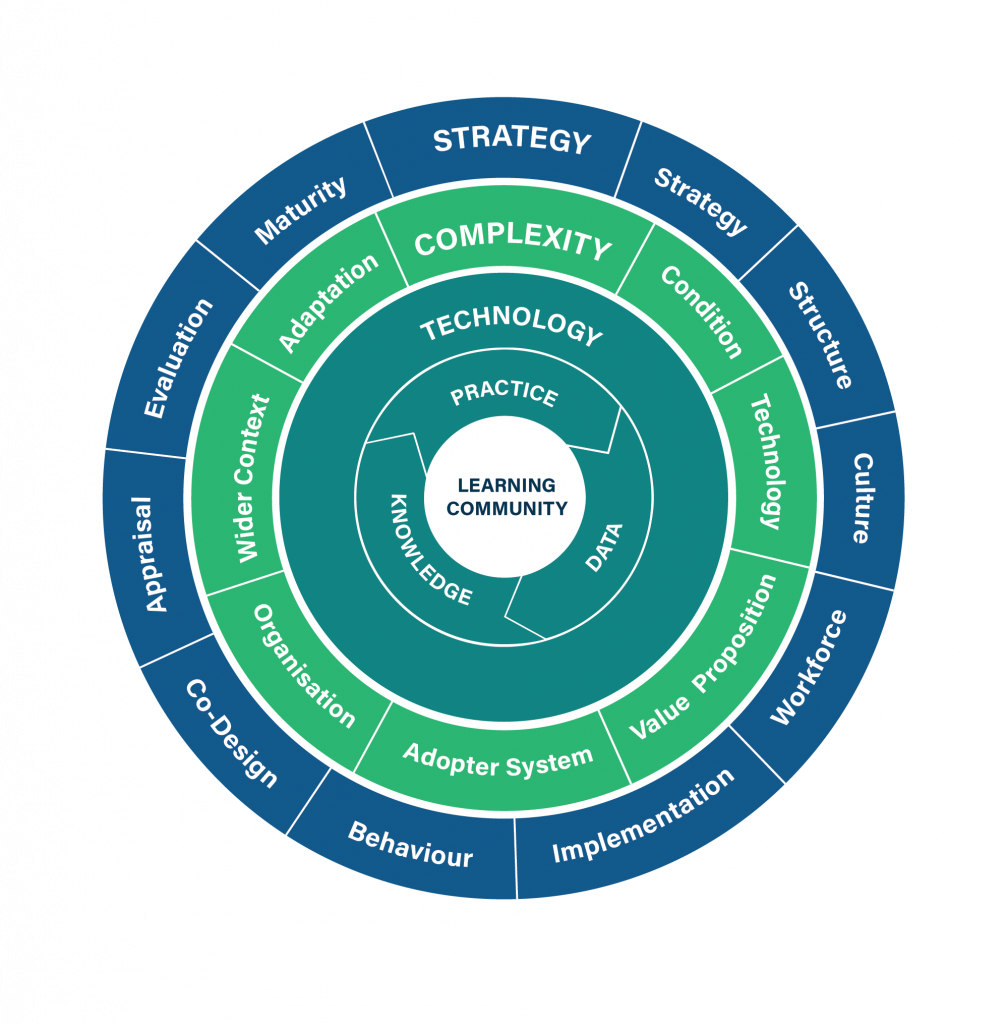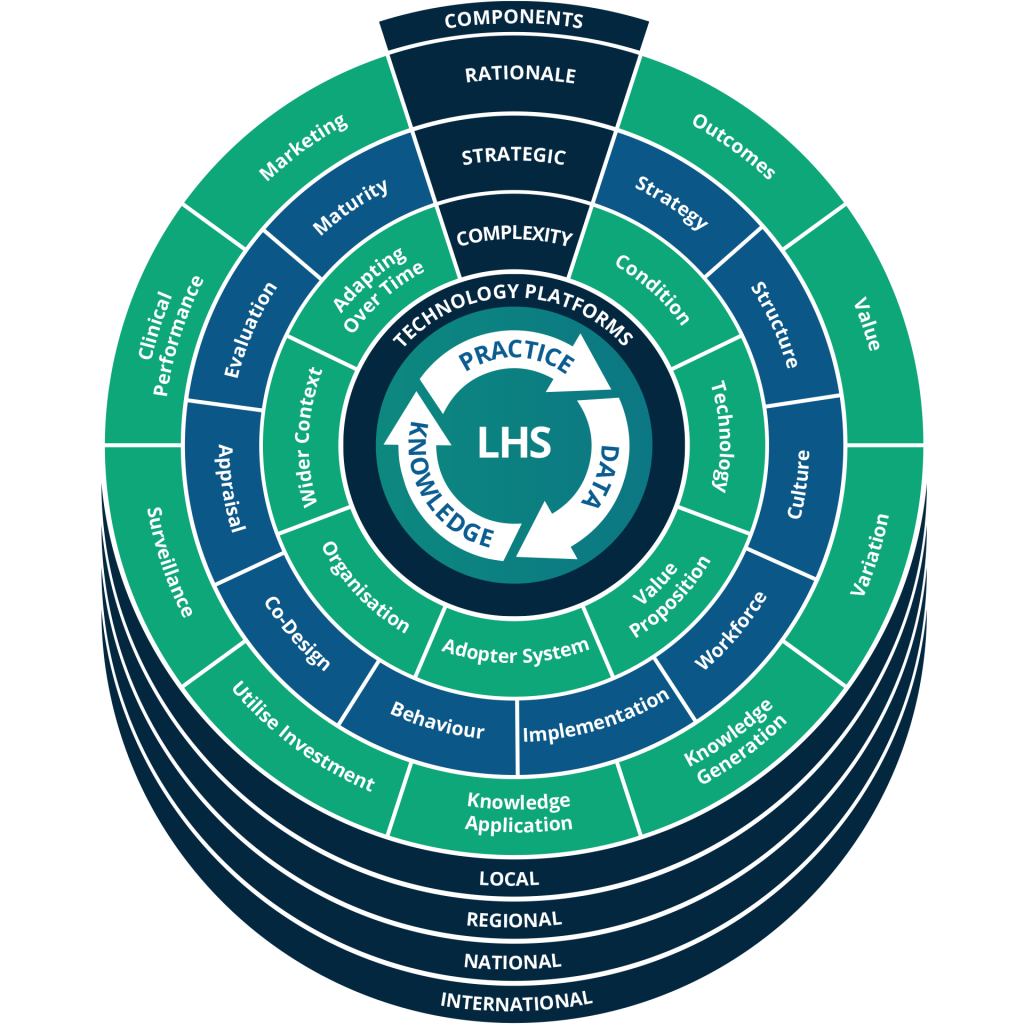Welcome to the Learning Health System (LHS) Toolkit
The Learning Health System (LHS) toolkit developed by The International Network for Activating Learning Health Systems (INACT-LHS) aims to provide guidance and tools for developing and implementing a LHS. We hope the knowledge shared and generated through this toolkit will further the development of this emerging field of science, policy and practice.
We invite you to use, add and update tools, and to help establish a learning community around LHS. We strongly encourage you to submit new tools – including case studies and testimonials – to enrich the content of this toolkit.
We need your feedback to continue improving the toolkit. Please fill out this short questionnaire, or email to let us know what you think at lhstoolkit@gwu.edu.

Finding your way around the toolkit
There are three main sections of this toolkit that can be accessed below, and by clicking the links above the title of each page. These are:
Find a tool: This page helps users identify tools for developing and implementing LHS, depending on what stage they are at in the development of their LHS. You can click on the Wheel’s rings to view different categories and subcategories of tools.
All tools: For users who want to view and use all the information available, this page presents all the tools included in the toolkit. You can dynamically filter the content using the filter terms on the top and on each card.
Submit a tool: We strongly encourage contributions to this toolkit. We’ll list your name as a tool contributor on the website, and through the toolkit we can disseminate any LHS tools you’ve found helpful to others who may benefit from them. To submit a tool (or case study), you’ll need to sign up for an account; however, it’s fast and free. Your submission will be reviewed by members of INACT-LHS on a quarterly basis and, if suitable, published in the toolkit.
How we built the toolkit
We structured the toolkit around a framework for developing Learning Health Systems that was outlined in a report from the Learning Healthcare Project. Resources from different content areas were included, including quality improvement, knowledge translation, value based healthcare, informatics, implementation science, complexity science and team science.
Two recent reports were utilized for identifying the initial tools included in the toolkit: a from the Learning Healthcare Project in the UK and a scoping review from the Australian Institute of Health Innovation and the NHMRC Partnership Centre for Health System Sustainability, Macquarie University.
Through periodic evaluation and updates and participation of interested parties (like you!), additional tools and experiences will be included.

What is a Learning Health System (LHS)
Learning health systems (LHS) are systems designed to bring information, science and innovation together and integrate knowledge and practice through cycles of continuous quality improvement and learning to improve healthcare quality. LHS have been conceptualized through multiple frameworks and models with a common focus on building better healthcare. The LHS concept has spread globally, with publications focusing on process models, micro to meso to macro system levels of analysis, infrastructure requirements to achieve such systems, the values underlying the cultural shift required to achieve such systems and case studies exploring the application of the concept within healthcare.
More information can be found at the Learning Health Project website learninghealthcareproject.org and the Learning Healthcare Project report.

Why you need an LHS
The rationale for developing a Learning Health System (LHS) includes improving patient outcomes and experience; providing better value; reducing unjustified variation of care; generating generalisable knowledge; optimising the use of knowledge and evidence for decision making; identifying and tracking epidemiological phenomena in near real-time; maximising the benefits of technological innovation and investment; expanding the education, training, and performance of clinicians and improving marketing.
Stakeholders should review their current systems before establishing a Learning Health System and be clear about what they are trying to achieve. You can further navigate and find what Tools might suit your needs at the Find a Tool page. You can share tools that you have found useful on the Submit a Tool Page.
More information about the rationale around implementing an LHS can be found at the Learning Health Project website and the Learning Healthcare Project report.
.
About us
The LHS toolkit has been developed by an international group in the field of LHS and quality improvement. The members of the international group INACT-LHS are listed below.
Jeffrey Braithwaite (Macquarie University, Australia) | profile
Tom Foley (Newcastle University, HSE Ireland) | profile
Charles Friedman (University of Michigan Medical School, USA) | profile
Sarah Gilman (The George Washington University, Wayfinder Health Strategies, USA) | profile
Kenneth Harwood (Marymount University, USA) | profile
Paige McDonald (The George Washington University, USA) | profile
Jessica R. Phillips (The George Washington University, USA) | profile
Joshua Rubin (University of Michigan, Learning Health System Collaboratory, USA) | profile
Robert Verheij (Netherlands institute for health services research (Nivel); Tilburg School of Social and Behavioral Sciences, the Netherlands) | profile
Philip van der Wees (The George Washington University, USA; Radboud University Medical Center, the Netherlands) | profile
The toolkit website was designed & developed by:
Remco Benthem de Grave (Newcastle University, UK)
Lenia Margariti (Newcastle University, UK)
List of Contributors
Many thanks to the following for contributing to the evaluation of the LHS toolkit.
Emily Hopkins (NHS England, UK)
Maaike Karemaker-van Bemmel (Ministry of Health, NL)
Laura Holdsworth (Stanford University, US)
Georgia Fisher (Macquarie University, Australia)
K-lynn Smith (Macquarie University, Australia)
Louise Wilson (Digital Strategy Lead, NHS, UK)
Soumia Meiyappan (Women’s College Hospital, Canada)
Victoria Betton (PeopleDotCom Ltd., techUK Health and Care Council, UK)
Ursula Hertha (Odnabruek University of Applied Sciences, Germany)
Jan Smeddinck (Ludwig Boltzmann Institute for Digital Health and Prevention)
Tom Hardie (The Health Foundation, UK)












